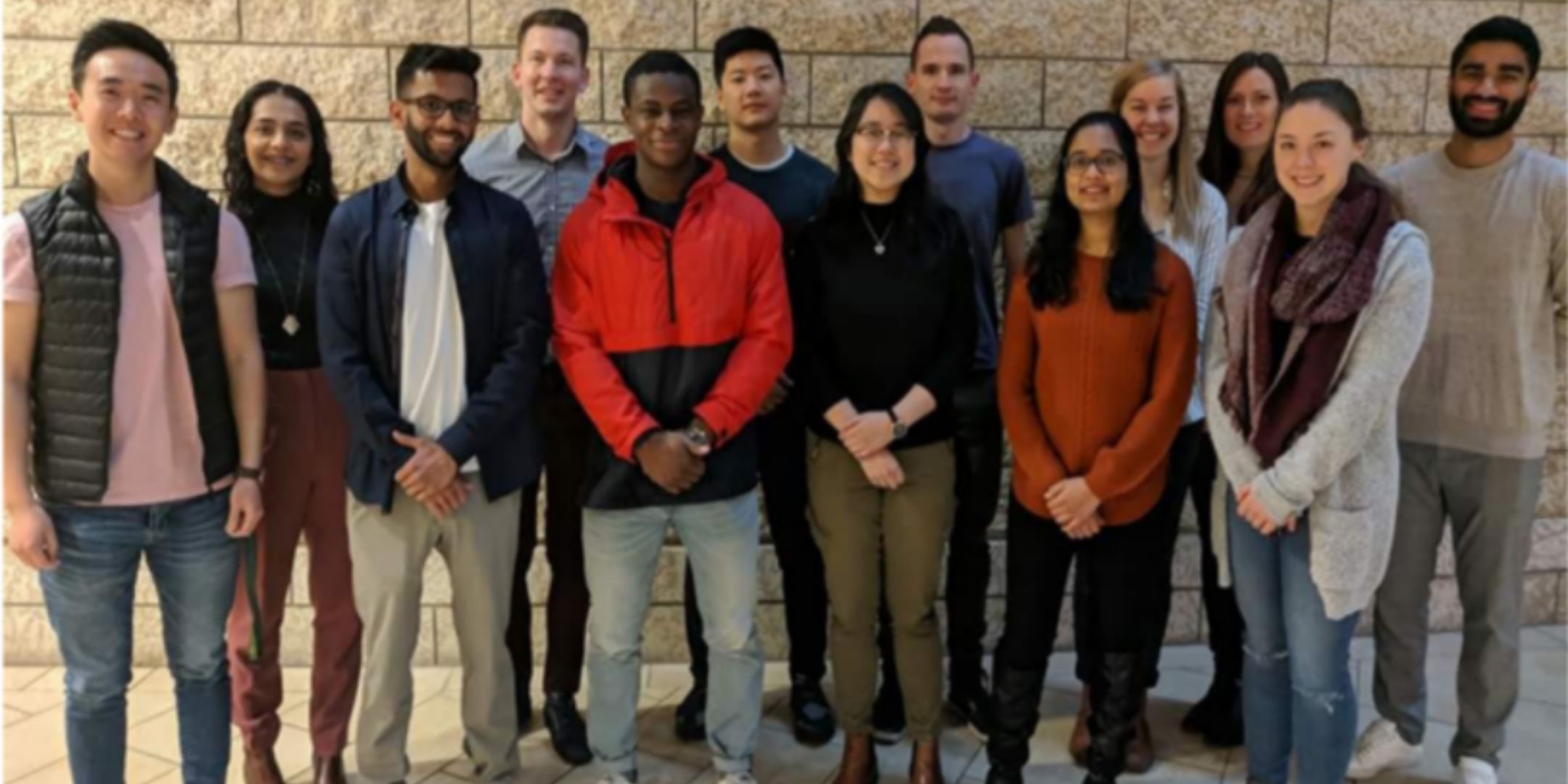Enthusiastic student-led MD AIDE program supports underrepresented applicants to medical school
By Sasha Roeder Mah - 22 February 2021

Members of the 2019/’20 MD AIDE leadership team. The program will be offered virtually this year, and hopes to reach its largest number of participants yet.
The daughter of immigrant parents, Sherry Mahmood witnessed firsthand the barriers members of marginalized communities can come up against in the path through academia and career launch.
“Although I have been very fortunate, there are people who look like me and aren't able to access the same opportunities,” says Mahmood, one of a group of current MD students who volunteer with the MD Admissions Initiative for Diversity and Equity (AIDE) program at the University of Alberta.
“Because of historical oppression or current systemic factors, there are individuals who need specific supports to have the same access in applying to medical school as their peers,” says Mahmood, who came to the U of A with a bachelor of health sciences from the University of Calgary and works in outreach for the program. “Because of social and financial barriers, there’s an opportunity gap.”
MD AIDE began in 2018 with an aim to bridge that gap with tutoring for Indigenous and low-income students to prepare for the infamously challenging Medical College Admission Test (MCAT). Preparation courses for the MCAT can cost in the thousands of dollars, a prohibitive cost for undergraduate students from low-income backgrounds.
Auriele Volk, ’16 BSc (Hons), will never forget her first day as a student participant in the summer of 2018. “The feeling of support from the faculty and the MD AIDE founders to continue my journey to medical school felt inspiring,” says Volk, who also received support from the Indigenous Health Initiatives Program (IHIP) office during her application process. Volk is now in her first year of the MD program and president of the Indigenous Medical & Dental Students Association. She’s also looking forward to giving back this summer to the program that helped her so much, volunteering as the content lead for the Critical Analysis and Reasoning section of the course.
One clear sign of the success of the program is that past participants like Volk are often keen to return as volunteers, says Mahmood. The other is the number of participants who are successful in their applications to medical school. “Over the past two summers, of the students who completed the program and applied for medical school, 11 were accepted,” says co-lead of this year’s program, Prachi Shah, ’18 BSc. And with the ways in which the program has expanded in the last year, Shah anticipates that number will only go up.
When it began in 2018, MD AIDE offered only MCAT preparation, and its target demographic was fairly narrow. They have since added a section on medical-school interview preparation, as well as a popular mentorship program, in which each participant is matched with at least one mentor—and often up to three, since there are so many eager MD student volunteers— for advice and help with career planning.
The team has also expanded its scope to include Black students, people of colour, students living with disabilities, LGBTQ+, recent immigrants or refugees and those who live in rural Alberta, says Mahmood. Much of their newfound ability to reach more people stems from the pivot to online programming necessitated by the beginnings of the pandemic last year. “With COVID, many things have become more challenging, but one of the good things to come out of it is that we have been able to expand our reach,” says Mahmood.
This meant that a program that had initially helped about 40 students was last year able to reach 51, and this year expects to break that record again, says Shah. Going online has proven to have other surprisingly positive results. “Participants have said it is a lot more flexible; we can work around their schedules,” says Shah. “Last summer we had some mature students who were working full time and some with young children, so having the classes recorded was a huge benefit for them.”
Going virtual has in fact proven so beneficial, the leaders are seriously considering keeping MD AIDE online, making it exponentially more accessible to the groups it most aims to help.
It’s not just participants like Volk who benefit from MD AIDE. Shah and Mahmood both insist that the volunteers get at least as much out of the program as the students they are teaching and mentoring.
“These are populations that we can learn from,” says Shah. “It’s important for physicians to learn early that no matter what background a person comes from, they deserve equal opportunity for success.”
“It’s very inspiring even having played one small part in fostering the next generation of health-care leaders from diverse communities,” adds Mahmood.
Both agree that volunteering with MD AIDE has clarified what it truly means to be a good physician. “It’s not just about the medicine,” says Shah; “it’s also about standing up for and supporting the populations we’re going to be serving.”
As for Volk, she remains grateful for the support of both IHIP and MD AIDE, which she says not only helped her fill in knowledge gaps in preparation for the MCAT, but also helped her translate some of her life experiences for the medical school interviews. After being accepted at all three of the schools she applied to—eventually choosing the U of A—Volk knows the process works.
Her words of advice to anyone considering taking part in MD AIDE? “Apply! It’s full of wonderfully supportive people and you’ll be surrounded by your peers, who are in the same boat. You can do this!”
Qualified students who are interested in applying for this summer’s MD AIDE can do so at this link by Feb. 28. Look for MD AIDE on Facebook and Instagram.